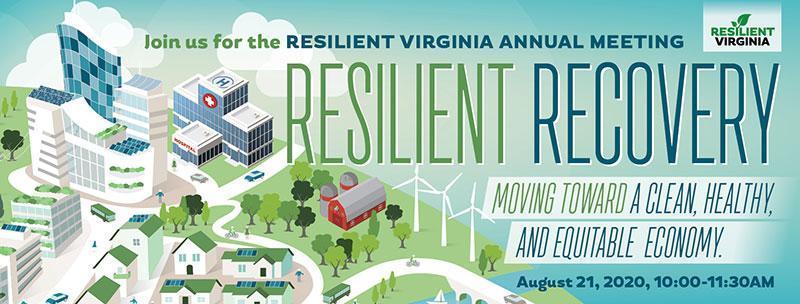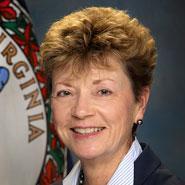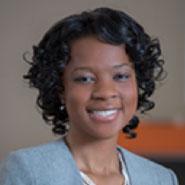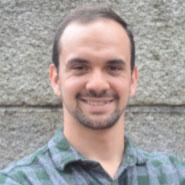
Resilient Recovery: Moving Toward a Clean, Healthy, and Equitable Economy
Friday, August 21st • 10:00–11:30 AM
AGENDA
- Welcome and Supporter Recognition
- Resilient Virginia Board Members Introductions
- Guest Speaker Presentations
- Ann C. Phillips, Rear Admiral, U.S. Navy (Ret.), Special Assistant to Governor Northam for Coastal Adaptation and Protection
- Sable K. Nelson Dyer, JD, Acting Director, Office of Health Equity, Virginia Department of Health
- Jonah Kurman-Faber, Senior Research Associate, Climate XChange
- Questions and Answers
- Announcement of the Fall 2020 Resiliency Academy Series
- Opportunities to Connect with Resilient Virginia
- Adjournment

Ann C. Phillips, Rear Admiral, U.S. Navy (Ret.)
Special Assistant to Virginia Governor Northam for Coastal Adaptation and Protection
Learn about the pending publication of the Coastal Resilience Master Plan, new Virginia standards to reduce the vulnerability of state-owned buildings, and other work to implement Governor Ralph Northam’s Executive Order 24, “Increasing Virginia’s Resilience to Sea Level Rise and Natural Hazards.”
Sable K. Nelson Dyer, JD
Acting Director, Office of Health Equity, Virginia Department of Health
Learn how the Health Equity Office is actively engaging in front-line response efforts surrounding the COVID-19 pandemic. Their innovative approaches include an on-going high-level Working Group, an equity guide for local health districts, and emphasis on multicultural and community engagement in urban and rural areas.
Jonah Kurman-Faber
Senior Research Associate, Climate XChange
Hear about a newly published economic analysis for Washington State that will help state policymakers design an economic recovery plan in response to the COVID-19 crisis that maximizes both job creation and the long-term health and climate readiness of Washington communities. The report finds that investing in clean energy and transportation, forest conservation and ecosystem restoration, low-carbon agriculture, and sustainable industry supports over ten jobs per million dollars invested — more than the return from the state’s ten largest industries.
Speaker Biographies
Ann C. Phillips, Rear Admiral, U.S. Navy (Ret.), Special Assistant to the Governor for Coastal Adaptation and Protection
Ann C. Phillips is the Special Assistant to the Governor for Coastal Adaptation and Protection for the Commonwealth of Virginia. Prior to joining the Northam Administration, she worked to address sea level rise and climate change impact on national security at the regional, national, and international levels, and chaired the Infrastructure Working Group for the Old Dominion University-convened Hampton Roads Sea Level Rise Preparedness and Resilience Intergovernmental Pilot Planning Project.
Prior to her work on climate change impact and sea level rise, Ann served nearly 31 years on active duty. She had the honor to commission and command USS MUSTIN (DDG 89) and to command Destroyer Squadron 28. Her final Flag command was as Commander, Expeditionary Strike Group TWO, including all the Amphibious Expeditionary Forces on the East Coast of the United States.
Ann earned a Master’s in Business Administration from The College of William and Mary—Mason School of Business in 2016. She is a 1983 graduate of the University of North Carolina at Chapel Hill. In addition, she is a certified Chesapeake Bay Landscape Professional, Level 2.
Ann.Phillips@governor.virginia.gov
Sable K. Nelson Dyer, JD, Acting Director, Office of Health Equity, Virginia Department of Health
Sable K. Nelson Dyer is a licensed attorney and public health policy expert, specializing in research, communications, and training in healthcare policy and legal analysis. She is a graduate of North Carolina Central University Law School, and holds a Bachelor of Arts degree in both Political Science and Biology from Howard University. Sable K is currently the Acting Office Director for the Virginia Department of Health, Office of Health Equity. She also holds the role of the VDH representative on the Health Equity Leadership Taskforce for the Health Equity Working Group during the COVID-19 response. Sable K remains engaged in local, state and federal HIV/AIDS, STI and Reproductive Justice Advocacy campaigns, base-building, training and educational initiatives as well as technical/capacity-building assistance.
She is an active member of the Delta Sigma Theta Sorority, Incorporated, as well as the NAACP National Board of Directors, with a devotion to social justice issues and a passion for politics. In her limited downtime, Sable enjoys cooking, knitting, playing with her dog, and watching historical dramas.
Jonah Kurman-Faber, Senior Research Associate, Climate XChange
Jonah is a Senior Research Associate at Climate XChange, a national research organization focused on state climate policy. He provides technical assistance to policymakers on climate policy, and has authored research on topics spanning environmental justice, public health, decarbonization, carbon pricing, and economic development. Most recently, he authored Build Back Better: Investing in a Resilient Recovery for Washington State, which provides a state-level stimulus recovery plan at the nexus of jobs, health, and climate. He is currently authoring similar reports for other states.
In addition, you’ll meet the Resilient Virginia 2020 Board of Directors and hear about our Fall 2020 plans to roll out Phase 1 of the Resiliency Academy webinar series.
Registration is FREE for current Resilient Virginia members and sponsors.

 Click to launch Presentation
Click to launch Presentation


